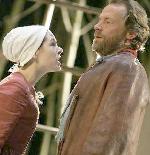SEARCH
REVIEWS
FEATURES
NEWS
Etcetera and
Short Term Listings
LISTINGS
Broadway
Off-Broadway
NYC Restaurants
BOOKS and CDs
OTHER PLACES
Berkshires
London
California
DC
Philadelphia
Elsewhere
QUOTES
On TKTS
PLAYWRIGHTS' ALBUMS
LETTERS TO EDITOR
FILM
LINKS
MISCELLANEOUS
Free Updates
Masthead
Writing for Us
A CurtainUp  London Review
London Review
 London Review
London ReviewThe Crucible
|
The pure in heart need no lawyers.
---- Deputy Governor |

Elaine Cassidy as Abigail Williams and Iain Glen as John Proctor
(Photo: Keith Pattison) |
The word crucible, beside its more usual meaning of a bowl where metal is heated, also has the rarer definition of a severe test or trial. Miller's play was written at the time of the McCarthy House UnAmerican Activities Committee hearings and there are clearly some parallels. The programme tells how in 1952 Miller, after talking to Elia Kazan who intended to give the names of those at Communist Party meetings in the 1930s, drove to Salem to research The Crucible. He found in the archives the names of those condemned by their neighbours in an attempt to secure their own safety. Driving back Arthur Miller heard on his car radio, Kazan's testimony, naming names. What is remarkable about Miller's play is that it is not simply a history play but a political play with far reaching parallels beyond the ones Miller would have seen at the time of writing it.
For full details of the plot see Elyse Sommer's review of the 2001 Broadway production go here The Crucible The all English cast have chosen to play with their own accents rather than American ones which isn't so strange when you realise that these people would have emigrated only one or two generations before. The first time I saw The Crucible I remember being impressed by how much it was about settlement and acquiring land: how if anyone confessed to witchcraft in order to have their life spared, their land would be forfeit and what seemed to be driving the adult accusers was property. This materialism seems so at odds with Christian values and the most acquisitive person in The Crucible is the preacher, the Reverend Parris (Ian Gelder) whom John Proctor criticises, an unwise action in retrospect as it incurs Parris' enmity.
Dominic Cooke's production is full of period atmosphere as the citizens of this part of Massachusetts parade their concerns. One can only feel sorry for the Putnams (Caroline O'Neill and James Staddon) with the deaths of so many children but this doesn't excuse their avarice. Trevor Peacock is often funny as the doughty Giles Corey, the man who uses litigation to defend his property and to attack that of others. Helen Schlesinger is coldly understated and calm as Elizabeth Proctor, John's wife. Iain Glen as John Proctor is dashing, handsome and dynamic, unwilling to conform and it is easy to see why Abigail Williams fell for him. Proctor's sincerity and bravery are without question, which of course makes the final scene when he is imprisoned full of pathos. Iain Glen is very impressive. Elaine Cassidy is perfect too as Abigail, the conniving and manipulative little girl who lies to cover up her dancing in the woods. When all the girls fall to the court room floor, writhing and parroting the Proctor's servant Mary Warren (Michelle Terry), it is as if they are choreographed in perfect symmetry. I liked the performance too of James Laurenson as the Deputy-Governor Danforth. He is the politician who finally decides, when faced with the Reverend Hale's (Robert Bowman) evidence of the innocence of the so called witches, that it is better to compound the crime with more hangings than to admit that they have made mistakes. It is this scene which struck the greatest contemporary political resonance for me. The ensemble performances are flawless.
Hildegarde Bechtler's Puritan plain and austere white sets have glimpses of the tangled branches of bare trees seen through the windows and doors. The Proctors house is warmed by a blazing log fire. The final scene reveals all of the tree trunks, an image of complexity, or of what lies outside, beyond the community. I end with Arthur Miller's words talking about the need for those Puritans to keep their community together, "The witch-hunt was a perverse manifestation of the panic which set in among all classes when the balance began to turn towards greater individual freedom."
|
THE CRUCIBLE
Written by Arthur Miller Directed by Dominic Cooke Starring: Iain Glen, Elaine Cassidy, James Laurenson, Helen Schlesinger With: Ian Gelder, Zoe Thorne, Lorna Gayle, Laura Elphinstone, Caroline O'Neill, James Staddon, Alison Garland, Micelle Terry, Darlene Johnson, Trevor Peacock, Robert Bowman, Clifford Rose, Ken Bradshaw, Tim Chipping, John Stahl, Susan McGoun, James Pearse, Catherine Skinner Design: Hildegarde Bechtler Lighting: Jean Kalman Sound: Paul Arditti Music: Gary Yershon Movement by Liz Ranken Running time: Two hours 55 minutes with one interval Box Office: 0870 890 1105 Booking to 17th June 2006 Reviewed by Lizzie Loveridge on 6th April 2006 performance at the Gielgud Theatre, Shaftesbury Avenue, London, W1 (Rail/Tube: Piccadilly Circus) |





